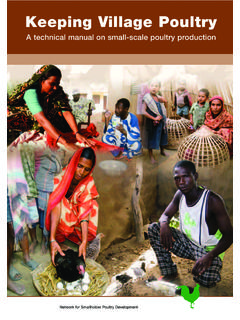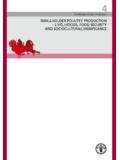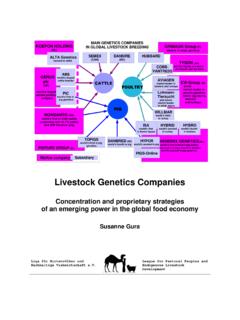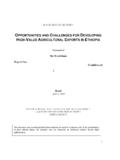Transcription of CABI
1 CABI CASE Study17 Good seed for quality produce: indigenous vegetables boost farmer incomes and livelihoods in TanzaniaSummaryAfrican indigenous vegetables (AIVs) have the potential to increase food and nutritional security and contribute to improved livelihoods, but farmers capacity to meet the growing demand for them has been constrained by a lack of good quality seed and technical knowhow. The Good Seed Initiative (GSI), funded by Irish Aid and active in Tanzania from 2013 to 2015, targeted both seed and vegetable growers, linking them to markets through an innovation platform (IP) approach. Production and utilization of quality AIV seeds has increased in Arusha and Dodoma, and cultivation of AIVs (both seed and vegetables) has increased farmers incomes and improved food and nutritional security for their communities.
2 Project approaches such as farmer-to-farmer training, IPs and entrepreneurship have helped achieve sustainable linkages and improved highlights 210 farmers trained in techniques for the production, processing and marketing of AIV seeds and produce, and a further 2,000 farmers trained through farmer-to-farmer extension. an AIV awareness campaign reached over half a million farmers, 43,000 of whom reported behaviour changes as a result. increased awareness of the nutritional benefits of AIVs has boosted demand for both vegetables and seed. 20,000 farmers accessed and utilized quality seed, which farmers now have a steady supply of. an IP approach convened stakeholders in the AIV value chain to address issues and solve problems.
3 Communities are reporting health benefits from consuming more AIVs. incomes and livelihoods have improved for project participants and IMPACT CASE STUDY 17 ContextAIVs play important roles in nutrition, food security, food diversity, rural development and sustainable land care (NRC, 2006). They are not only consumed as food but also for their preventive and curative medicinal properties (Keding et al., 2007). Awareness of the nutritional benefits of AIVs is growing amongst many East African consumers, elevating their commercial importance (Irungu et al., 2007); this has seen AIVs enter into lucrative markets resulting in better incomes for smallholder farmers. However, farmers capacity to meet the growing demand for these vegetables has been limited by a lack of good quality seed and technical packages (Onim and Mwaniki, 2008).
4 AIVs have not received sufficient attention from research and extension despite their potential for food and nutritional security in Aid-funded activities under the GSI programme by CABI and partners in northern and central Tanzania, aimed to partially fill this gap by improving seed systems and enhancing farmers access to quality seeds increasing production, productivity and farm incomes, and impacting positively on food security and economic development. CABI s work in the seed sector, over the past decade or so, has demonstrated that both supply of, and demand for seed must be addressed: even in situations where, at the outset, there is apparent unmet demand for quality seed, it can be easy to swing into a situation of oversupply.
5 Notably, initiatives that stimulate the demand for agricultural produce from quality seed have promoted the long-term demand for those seeds. GSI project activities took that into account, looking into behaviour change in the AIV sub-sector, creating awareness of the nutritional benefits of AIVs, creating demand for them amongst farming communities, and building farmer capacity to meet that we didGSI reviewed all links in the AIV value chain from production and sale of seed, to vegetable growing, trade and consumption looking to strengthen existing links and create new ones where and partners Assessed training needs to develop relevant training curricula. Trained AIV seed and vegetable producers in good agricultural practice and linked them to extension services.
6 Supported the development of farmer-led seed enterprises. Created, supported and improved linkages between seed producers and small- to medium-sized seed companies; and between AIV growers and traders. Promoted awareness of the nutritional benefits of AIVs, boosting their consumption and increasing demand for seed and were trained on soil and water management, nursery bed establishment, timely planting, water conservation, irrigation and field monitoring to establish extent of diseases/pests and to determine control measures required, and the safe application of pesticides. Seed producers were guided on post-harvest handling of seeds, contract farming and record-keeping. Vegetable growers received training on post-harvest handling, processing and marketing of vegetables.
7 The vegetable growers went on to train others and through this farmer-to-farmer extension about 2,000 farmers received training in vegetable production. Extension workers monitored the quality of this training. Farmer field schools, locally known as Shamba Darasa, were established by farmer groups, and facilitated by extension workers. These demonstrations enhanced the observational learning of community members. Seed production was organized into two distinct systems: certified seed (through contract farming) and Quality Declared Seed (QDS). Seed producers included: those in Dodoma in the central region who underwent training, registered with the Tanzania Seed Certification Institute (TOSCI), produced seed under the QDS system, and sold seed within their community or to agro-dealers contract farmers in Arusha in the north who produced seed under contract to seed companies While contract farming provided a clear market outlet for seeds produced by farmers, QDS played a bigger role in ensuring access to quality seed for local farmers.
8 The approach hinges on the principle of seed entrepreneurship, where seed producers are commercial entities producing seed for the purpose of selling to other farmers or other activities such as AIV rallies, cookery shows and nutritional outreaches spread awareness of the nutritional benefits of AIVs and healthy methods of AIV preparation, especially to members of pastoralist communities, who are not typical consumers of vegetables. Radio programmes broadcasted information on AIV production, marketing and consumption. Information packs and seed packs were distributed. GOOD SEED FOR QUALITY PRODUCE: INDIGENOUS VEGETABLES BOOST FARMER INCOMES AND LIVELIHOODS IN TANZANIAThe project used an IP approach whereby public and private sector stakeholders were convened to identify constraints and plan, implement and monitor actions to address them.
9 It allowed stakeholders to share ideas and knowledge, helped farmers to secure markets for their produce and allowed contracts and partnerships to be negotiated between producers and impact was achieved?Impact was assessed through two sets of activities conducted in November 2015: a quantitative household survey that gauged the effect of promotional activities on awareness, perceptions and selection of AIVs by consumers a qualitative study 15 focus group discussions (FGDs) in Arusha and Dodoma that reviewed changes in knowledge and practices of trained seed and vegetable from these studies, combined with performance data and empirical evidence, demonstrates the following project impacts:Increased awareness of the benefits of AIVsFarming communities have an increased awareness of the benefits of AIV.
10 Over 6,500 farmers attended rallies in Arusha and Dodoma; approximately 3,000 farmers were reached through agricultural shows and fairs; and radio shows reached approximately half a million farmers, 43,000 of whom reported behaviour change as a result of the campaigns. The impact of this is twofold: by demonstrating the economic advantages of growing AIVs over other slower-maturing, labour- and input-intensive crops, the project motivated farmers to start growing AIVs. Secondly, by increasing awareness of the nutritional benefits of AIVs, the project increased demand for AIVs, thus providing ready markets for the farmers produce. Training and capacity-building of seed producers and vegetable growers Approximately 210 farmers received on-farm training through Shamba Darasa and were given inputs and equipment such as improved seed and solar dryers.





